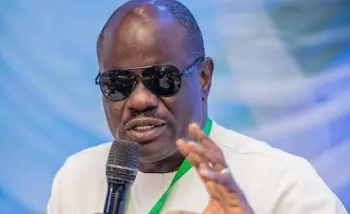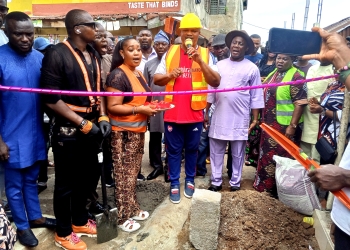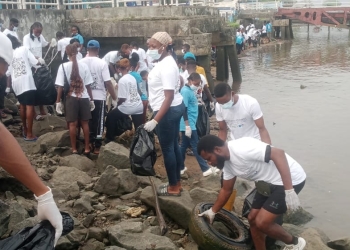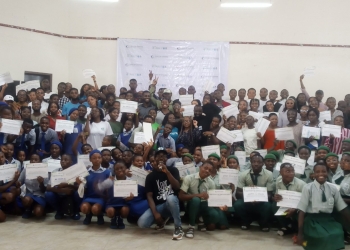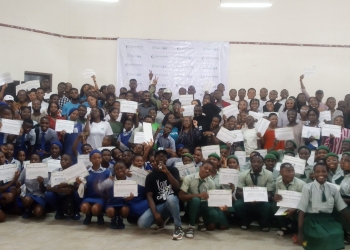By Anietie Akpan
Cross River Communities have lauded the intervention of the United Nations Children’s Fund (UNICEF) and its partners on mangrove protection as a critical solution to climate change.
This intervention is in the planting of mangrove trees as the defendants of communities from floods along the long stretch of Esierebom coast line in Calabar South Local Government Area (LGA) by students of Government Secondary School, Uwanse, Margaret Ekpo Secondary School, Calabar and the University of Calabar (UNICAL).
About 170 trees were planted on Friday, April 4 as part of the three day (April 3-5, 2025) Climate Education and Awareness programme on the theme: “Tides of Change-Young Voices for a Greener Coast”; powered by UNICEF, GreenRising, GenUnlimited, YPAT and the UNICAL and implemented by Biodiversity Rescue Club (BRC) Nigeria and Plogging Nigeria”.
The excited Esierebom community and its neighbours said, in what the school children are doing today concerning the Mangrove tree which they are planting in Esierebom Ewa Ekeng community, “is a welcome development and we are thrilled”.
The Village Head of Esierebom/Ewa Ensa clan, Chief Ewa Edem Richard Henshaw, said, “these mangrove trees have helped us a great deal because in Anatigha, where these trees were not planted, water had flooded the area and brought down most houses there. But as these school children have come planting it in this our community, it will help us in so many ways”.
The Village Head who was represented by the Etubom Mkparawa (Youth Leader) of Esierebom Ewa Ekeng/Effiom Ewa Nsa clan, Chief Ekeng Ekpenyong Henshaw, said, “these idea by UNICEF, the NGOs and the children is a very good idea which will help us a lot in future because our children, children children and others will benefit from it. Our coastlines and communities will be safe”.
“In the ones that were planted many years ago people cut them down as fire wood but as the Village Head and myself intervened and stopped people from cutting down the mangrove trees used as fire wood or any other thing, the situation has improved.
“So I am very happy that UNICEF and the NGOs are coming back using the school children to plant new ones. About 3,000 seedlings were planted last year and as we entered the swamp today they are all growing well”.
His words : “Today they have brought in over 100 trees and as a community leader I have gone in there and did as the village head instructed me to do.
“So may the Lord almighty protect and guide them in this effort of helping the community. And those sponsoring them to help plant these trees to check the encroachment of water and force it back to the ocean, God should bless them”.
About five years ago, when the mangrove trees were planted, he said, “some people go in and cut them but current village head and myself as the Youth Leader now caused an announcement to be made in the community warning everyone to stay away from the mangrove forest and anyone caught will be handed over to government and their agencies .
“That is why the 3,000 that were planted last year are growing very well and the ones they have planted today no one will enter the mangrove forest to cut them. We are very happy and excited with this mangrove tree planting sponsored by UNICEF and pray more should be planted to protect our coastal communities”.
BRC Nigeria, one of the implementing organizations for the mangrove tree planting, represented by its Founder and Executive Director, Mr. Clement Adagbor Oko, said, “we are here to plant mangroves, we are planting 100 mangroves today as a way of carrying out environmental action, not just speaking advocacy but carrying out the action on ground”.
On why mangrove is planted on the coast lines, he said, “Mangroves serve as a very important solution to climate change. They conserve 10 times carbon more than in tropical rainforests and this coastal community, Esierebom is vulnerable to flooding. The mangroves are to protect and act as the defendants of the community from floods”.
On economic benefits, Oko said, “mangrove trees also provide social economic benefits to the community as source of livelihood and the most economy they do here is fishing. So the mangroves are biodiversity hotspots to this fish, but because of the degradation of the mangroves, the fishermen may have to go so far across the sea to get this fish as against what they usually get before within the area and this has made a decline in their fish population and of course the cost is also telling on the cost of purchase if you want to get this fish from these people that sell by the roadside.
“So we are doing this mangrove thing as a means of restoring back the ecosystem, mitigate climate change and provide social economic benefit to the community, as well as defend them from erosions and floods as sea level rise.
“We are collaborating with Plogging Nigeria to carry out the planting exercise today at Esierebom community, funded by UNICEF, UNICAL and others”.
He explained that “it takes about six years for a newly planted mangrove trees to get to maturity” and on how they intend to preserve the trees, “that’s why we did a lot of sensitization campaigns, not just going in to plant mangroves”, Oko added.
“If these people don’t know why you are planting mangroves, they will still go in there tomorrow. So that’s why we carry out a lot of advocacy, sentization to let them know the disadvantage of cutting down the mangroves. They see the sea floor, they see like this area, if it rains heavily, they get water full of this place, you can’t pass this road.
“So they themselves experience this action, this climate action, but they may not know that, that was the cause. So we try to make them know this is the cause of it. And, thank God for the community leadership that are cooperating with us.
“They are also trying to, they are working very well, they are accommodating, working with us, and they are trying to make bylaws to protect the mangroves. So these bylaws were one of the things we look out for to restrict entry into the mangrove to reduce deforestation of the mangroves”.
On his part, the Executive Director of Plogging Nigeria Muyiwa Iyamolere commented UNICEF and others for the climate change programme saying, “we are the implementing organization for this project. This project is powered by UNICEF through the Green Rising Initiative, which is a project to mobilize youths to take climate action around the world. We are working in Nigeria, mobilizing youths here in Calabar today to plant mangroves”.
He said, “we are planting mangroves in Eserobom because they are very important for the environment. So the mangroves help to sequestrate carbon, which is a very important thing to mitigate the climate crisis we are experiencing.
“And also for this community, being a coastal one that is very close to a large river that enters into the ocean, the mangroves help to serve as a barrier to prevent or to reduce the level of flooding that affects this community. So they absorb water, serve as a fence around the community, and we are trying to help to restore those mangroves because of nipa palms that have invaded the area.
“They are invasive species, so we are cutting those ones down, planting mangroves for the benefit of the community, to mitigate the climate crisis, and also animals, creeping animals, and other different species of animals that reside in the mangrove habitat is restored, and everyone is happy”.

